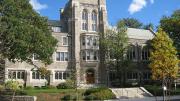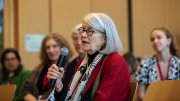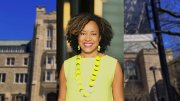Seriously and joyfully, Harvard Divinity School (HDS) began the academic year, and celebration of its bicentennial year*, with images and words that looked back with candor and respect and simultaneously propagated enthusiasm for the school’s colorfully bannered mission to “Illuminate. Engage. Serve.”
Tuesday’s events, the first of a wide-ranging year’s worth, began with an afternoon panel discussion introducing Faces of Divinity: Envisioning Inclusion for 200 Years, a 21-station visual and audiovisual “exhibit of landmark themes in the history of HDS” on display within Andover, Divinity, and Rockefeller halls throughout the year. Ann Braude, director of the Women’s Studies in Religion Program and senior lecturer on American religious history, curated the exhibit, aided by doctoral candidates Christopher Allison, Eva Payne, and Thomas Whittaker; the goal, she has said, was showing how HDS “went from being a basically Unitarian school in 1816 to a multireligious school in the twenty-first century.” (Braude explored one major change at HDS, the admission of women, in “A Shift in the Created Order,” published in the May-June 2006 Harvard Magazine.)
At 5 p.m., a cheerful crowd gathered under a white tent behind Andover Hall for Convocation. Welcomes from dean of the faculty David N. Hempton and Harvard president Drew Faust preceded short readings from Hindu, Jewish, Buddhist, Christian, and Islamic texts. In their comments, both dean and president mixed levity with reflection. Hempton, looking ahead to bicentennial events, promised parties as well as outstanding lectures and conferences as “we remember our past, reflect on our role at Harvard and in the wider world today, and look to the opportunities and challenges of our third century.” Faust paused for a moment, in her short speech honoring the school’s evolution into a “community more diverse and dynamic than its founders could every have imagined,” to note: “I’m proud to wear robes that are meant to be those of an early divine of Harvard origin…I’m sure that shocks all those people in their graves.” (The speech incorporated portions of her tribute to the school in this magazine’s current issue.)
HDS’s twelfth dean, George Rupp, who left Harvard in 1985 to become, successively, president of Rice, Columbia, and the International Rescue Committee, delivered the Convocation Address. Surveying “Challenges for a Third Century,” he began by recalling the
extended period, one that many of us experienced personally, when religion was widely construed in the academy to be a relic: a remnant of the past and therefore an exercise in nostalgia doomed to expire in the near future with the triumph of one variant or another of secular liberalism.
Today, he continued,
fewer of our colleagues in this and other leading universities are so confident about the imminent demise of religious allegiance and action. Even when the impact of religion may be deemed to be less than positive, even perverse, its pervasive influence cannot be denied. It is therefore all the more apt that we consider carefully the mandate of the Harvard Divinity School for the years, decades, and centuries ahead.
Suiting the opening of the academic year, Rupp offered specific ways to generate energy for the school by focusing on “three core sets of strengths”:
first, the capacity to ground students of all ages in the core traditions of their own communities, including respectful comparisons to other traditions sympathetically understood; second, a commitment not only to the descriptive study of multiple traditions but also to normative appraisals based on comparative assessments of the impact religious convictions have on the broader society; and third, a concern to prepare leaders both for particular religious communities and also for engaging the dimensions of ethics and values in societies around the world and indeed in the emerging global community toward which we aspire.
Amid the bicentennial’s opportunity to celebrate the school’s impressive accomplishments to date, he declared himself confident of its “positive trajectory” in addressing the crucial challenges to come “in the next chapter of this remarkable story.”
Read the Divinity School’s coverage here.









